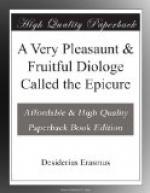soo weaken the state of their bodyes, that by reason
therof, the chearefulnes of their myndes neuer sheweth
it selfe, neyther in these thinges, || nor yet in
their deathe. The mynde, forsooth thoughe it bee
inclosed within this mortal bodye, yet for that it
is of a stronger nature, it sowhat trasfourmeth and
fascioneth the bodie after it selfe, especially if
the vehement instigation of the spirit approche the
violent inclination of nature: this is the cause
we see oftentymes suche men as bee vertuous die more
cherefully, then those that make pastyme contynually,
& bee yeoue vnto all kynd of pleasures. SP.
In very dede, I haue meruayled oftten at that thyng.
HED Forsoothe it is not a thyng too bee marueyled
at, though that there shulde bee vnspeakeable || ioy
and comforte where God is present, whiche is the heed
of all mirth and gladnes, nowe this is no straunge
thyng, althoughe the mynde of a godly man doo reioyce
contynually in this mortall bodye: where as if
the same mynde or spirit discended into the lowest
place of hell shuld lose no parte of felicitie, for
whersoeuer is a pure mynd, there is god, wher God
is: there is paradise, ther is heauen, ther is
felicitie, wher felicitie is: ther is the true
ioy and synsere gladnes. SP. But yet they shuld
liue more pleasauntly, if certein incommodities were
taken from them, and had suche pastymes as eyther
they dispise orels can not get nor attaine vnto. HE.
||E.i.|| (I praye you) doo you meane, suche incommodities
as by the commune course of nature folow the codition
or state of ma: as hunger, thirst, desease, werynes,
age, death, lyghtnyng yearthquake, fluddes & battail?
SPV. I meane other, and these also. HEDO.
Then we intreate styll of mortal thynges and not of
immortal, & yet in these euils the state of vertuous
men, may bee better borne withal, then of suche as
seeke for the pleasures of the body they care not
howe. SPV. Why so: HEDO. Especyally
because their myndes bee accustomed and hardened with
most sure and moderate gouernaunce of reason against
al outragious affections of the mind || and they take
more patiently those thynges that cannot bee shonned
then the other sort doo Furthermore, for as muche as
thei perceiue, all such thynges ar sent of god, either
for the punishment of their faultes, or els too excitate
and sturre them vp vnto vertue, then thei as meeke
and obediente chyldren receiue them from the had of
their mercifull father, not only desireously, but
also chearefully and geue thankes also, namely for
so merciful punyshment and inestimable gaines. SPV.
But many doo occatio griefes vnto the selues. HEDO.
But mo seeke remedye at the Phisicions, either
to preserue their bodies in helth or elles if they
bee sycke, too ||E.ii.|| recouer health, but willyngly
too cause their owne sorowes, that is, pouertie, sickenes,
persecution, slaunder, excepte the loue of God compel
vs therto, it is no vertue but folishnes: but




